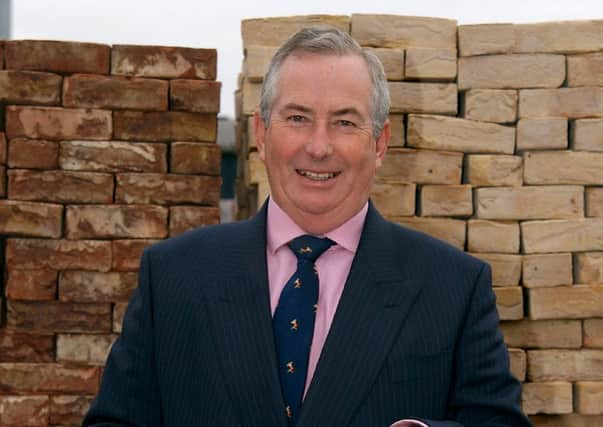Profile: David Armitage, York Handmade Brick Company


As an entrepreneur of more than five decades, bricks have been David Armitage’s life since childhood.
The son of a surgeon, he has been at the helm of two very successful brick manufacturers for 50 years.
Advertisement
Hide AdAdvertisement
Hide AdSince 1988 he has run the York Handmade Brick company, a much-respected manufacturer in the building, architecture and conservation sector.


From an innocuous country lane at Alne, near Easingwold in the glorious Vale of York, his firm has supplied bricks which have graced iconic structures such as London’s The Shard, Prince Charles’s Dumfries House and even Halifax’s proud new library building.
Today his son Guy runs the day-to-day side of things but Mr Armitage remains heavily involved with the business and is passionately committed to both the business he built and the sector which has provided much of his family’s income since the reign of George IV.
“I come from a brickmaking dynasty if you will,” he tells The Yorkshire Post.
Advertisement
Hide AdAdvertisement
Hide Ad“The Armitages have been have been making bricks since 1824. We originally started just outside Wakefield in Robin Hood and that is where we came from. I was the fifth generation in the business and my two cousins ran it with me.”


As often happens with family businesses his partners wished to retire and the business was sold.
“So there I was at 48 and, rightly or wrongly, I decided to stay in the brick industry.
“I had always enjoyed it and I had a very nice career.
“The only problem is there were not that many brick works around but fortunately there was one here.”
Advertisement
Hide AdAdvertisement
Hide AdIn 1988 he bought the business formerly known as Alnebrick and recently renamed as York Handmade Brick Company, a name he decided to retain on the basis that “it tells you what we do”.
The first weeks of his time at the business were a steep building process, but Mr Armitage was helped by a solid team that he had inherited.
“We started out with almost nothing. I am not being funny but when I first came here it was a virtually derelict site, so first of all we had to spend some money, which we did to make the place more or less habitable.
“I virtually started on my own but I put a great deal of importance on the fact that there was an excellent factory manager in place, Steve Pittham, who is still here.
Advertisement
Hide AdAdvertisement
Hide Ad“He was a key player and I think there are eight to 10 men who are still here when I joined.”
York Handmade Brick Company’s commitment to the traditional way of throwing bricks manually stands in stark contrast to the increasingly automated methods many of its competitors follow.
When asked what the difference between handmade and mechanised bricks is, Mr Armitage said: “I think the answer overall is the character, you only need to look at the buildings and they just look different.
“A little bit of it is that they are handmade so people know they must be special and, thank goodness, will pay a premium for it, as they are not cheap to produce.
Advertisement
Hide AdAdvertisement
Hide Ad“I have worked in a modern factory before with all-singing, all dancing machines but unfortunately, apart from York Handmade, they can’t produce a brick which is convincing and looks the part and that is particularly true when it comes to restoration and conservation.
“And yet a lot of modern designers use them, you can do a lot with handmade bricks. You can do a lot of different shapes and sizes for the same buildings but with machines you can’t. I never wanted to have a robotic setting.”
Within five years Mr Armitage had built a business turning over £1m.
However, when the economy crashed in 2008 much of the demand for housing, and subsequently bricks, dried up virtually overnight and as Mr Armitage admits things “ground to a halt”.
Advertisement
Hide AdAdvertisement
Hide AdFollowing the downturn, he diversified the business’s model to other markets other than self-build.
“We are quite well spread and this is an improvement since the 2000s,” he said.
“Self builders have always been important to us and still are.
“But since the recession we do a lot more architect specification work which is very important to us.
Advertisement
Hide AdAdvertisement
Hide Ad“First of all it is good fun to do. It is more tricky and challenging but it is much more interesting and it is much more high profile of course.”
Mr Armitage points to a picture of Halifax’s new library building, one that is made from distinctive bricks made by his business.
“We cover a very wide-ranging specification of buildings. We have done high profile ones like the Shard and quite a number of good commercial jobs in London, so we are very pleased with that.”
Mr Armitage is bullish about the firm’s prospects for the future.
Advertisement
Hide AdAdvertisement
Hide Ad“We are now about £2.5m (turnover) and have plans to expand. We are looking at some new investment and once we have got that in place we should be able to step it up.”
Despite 50 years in the business and the firm’s operations now handled by his son, Mr Armitage said he has no immediate plans for retire- ment.
“I thoroughly enjoy it,” he said.
“I have seen so many family businesses in Yorkshire that have been ruined because the old man stayed on too long.
“So I know the downsides and I hope I can genuinely say that Guy is happy that I am still here.
Advertisement
Hide AdAdvertisement
Hide Ad“One of the reasons I started back in the brick industry was that I was particularly keen to put something back into an industry I got so much out of.
“That was my driver really, and I am delighted that Guy has joined me.”
Mr Armitage said that the face of Yorkshire business had changed dramatically in his career.
“I think Yorkshire is great,” he said.
“I am a Yorkshiremen obviously, I was born in Leeds.
“It is my first loyalty. It is a great place to do business and it so varied.
Advertisement
Hide AdAdvertisement
Hide Ad“Leeds is very different, when I was a lad it was all textiles, that has virtually all gone.
“I think Yorkshire has done very well to reinvent itself. When I was young everyone I knew was in textiles with one or two in engineering or collieries.
“People have shown a lot of ingenuity to change things.”